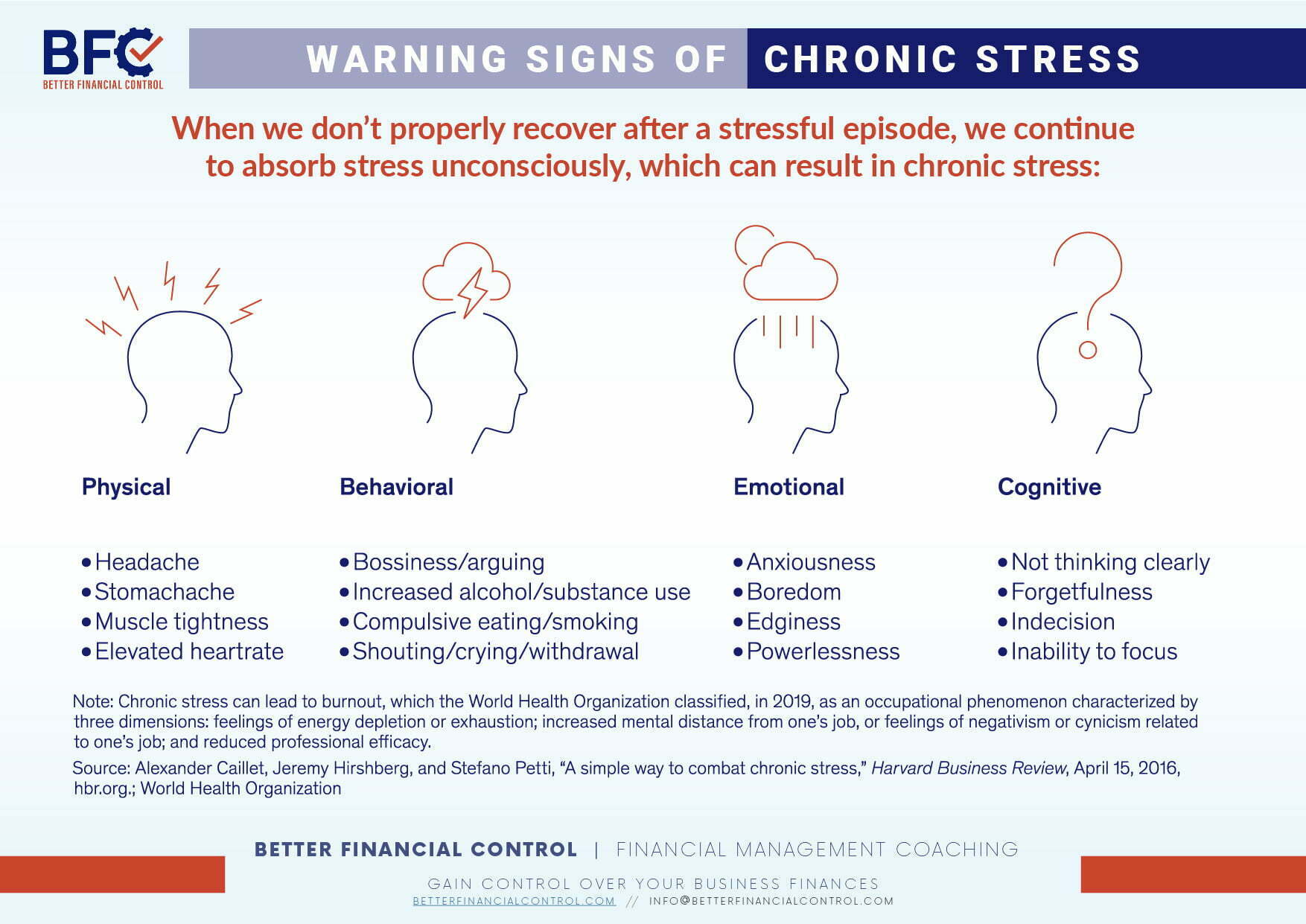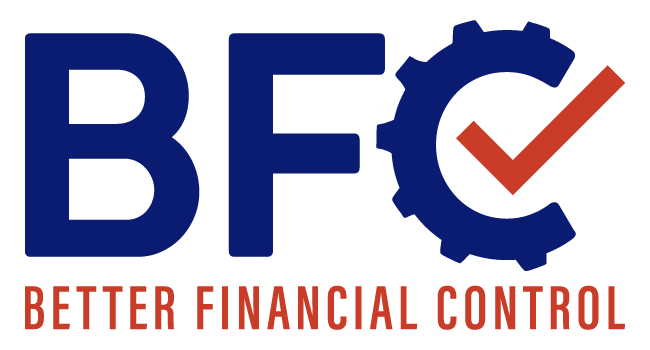Many say ‘Stress is a killer.’ This is only partially true.
Short-lived jolts of stress – known as Acute Stress – are perfectly normal and are actually beneficial. Chronic Stress, on the other hand, can be a major problem. This is where the body doesn’t have the opportunity to go through the recovery process, remaining in a state of stress for a longer period, causing harm to your body and quality of life in many different ways.
Below is a good reminder by McKinsey & Co on how we are negatively affected by chronic stress.


Obviously, running a team or business is a high-pressure, target-rich environment filled with continual triggers that can lead to symptoms of chronic stress – whether those are physical, behavioural, emotional or cognitive as outlined in the above infographic.
Here are a few of the most common chronic stress creators for business leaders:
Cash Insecurities
Not knowing if you can pay your employees or vendors is an awful feeling that can create an endless thought loop of stress. Most of us have felt this at some point in our careers, sensing this impending dark cloud constantly lingering in our periphery. Even when you can find a moment of calm, your mind soon remembers the concerns and the cycle of stress begins again.
Team Performance
There is nothing quite as stress-inducing as the thoughts and feelings around paying employee’s salaries yet still feeling the responsibility for ensuring their work gets done. This is the easiest time to question why you have a company in the first place. You have magically figured out how to work harder, have more pressure, yet make the same or even less money than when you were running the company alone. Why is it so hard to find humble, hungry and smart team members?!
Accumulative Problems
When you are a business owner or even run a team within a larger business, unplugging from your work is difficult to do. One of the biggest chronic stress creators is the consistent concern about what the next big problem will be. And because you don’t know from where the problem is going to arise there is a constant sense of stress around these unforeseen, often imaginary issues.
Not feeling in control can have the same effect on your heart as actually enduring the stress-inducing problems. So even when problems aren’t hitting you, they are still impacting your body and its health.
Your body responds to this loss of control in the same way it responds when stressful events happen. It increases:
- The amount of stress hormones in your body
- The amount of Inflammation in your body
- Your heart rate and/or irregular heart beats
- Your blood pressure
Following are some prime examples of how business owners we’ve worked with have improved some of their chronic triggers for stress:
Clear Cashflow Forecast
On of our clients had had enough with feeling the fear of not knowing what she could and could not afford to pay for in her business. Her solution was to do whatever was necessary to obtain an accurate 3-month cashflow forecast. Although it took a while to implement the necessary processes and disciplines, within a couple months of testing and tweaking she not only found financial clarity, she also identified some quick cost-savings wins that more than remunerated the time and effort.
Better Accountability Chart
We challenged a client to reassess how their management team was lacking accountability for their results. Fortunately, this leader trusted our guidance, setting aside judgments on what should be required for a manager and act on our suggestion. Our request was that he spend time clarifying each of his managers’ roles in two key areas. The first: describing specifically what the role was accountable for. It didn’t take long for the leader to see how expectations weren’t clearly defined, either to them or to their managers. The second area: to identify objective ways to measure whether the manager was delivering on their role’s requirements. This necessitated a significant amount of thought by the leader, making it abundantly apparent that there could be a disconnect between the leader’s expectations and the manager’s objectives. The end result was a better-performing management team that had improved clarity on how to fulfil their responsibilities as well as support the company leader, creating s significant reduction in stress throughout the management team.
Clear Process for Responding to Problems
One of the business leaders we work with struggled with the concern of impending problems. She found it consuming her personal life and made it a key deliverable for us to assist her with. After some investigation we found that her company didn’t have a clear and proactive way to identify, discuss and solve problems. This meant that many problems were not identified early on because they weren’t big enough to receive attention. So what could have begun as a small error rapidly escalated into lost revenue and the client firing the company.
This is like the principle of forest fires. By eliminating a single spark, you can save an entire forest; so by recognising and resolving small issues early on, you eradicate the possibility of major problems arising.
We helped our client and her team allocate a portion of their weekly management meetings to identifying any issues and resolving them before they escalated. These clear resolution strategies were then tracked week-over-week until the issue was fully resolved. This allowed our client to feel she was in control of seeking problems out rather than waiting for the next big issue to land on her desk. More than that, the stress she had been feeling in her time outside of work completely evaporated.
These three examples demonstrate how problems can get the better of us, creating untold levels of stress. But how, with a little planning and thought, they can be easily rectified, not only removing any stress they instigate, but also improving company functionality and productivity.
This outlines the ways in which chronic stress can creep up on us, but also how this can be rectified. Next week, we will take a look at three specific strategies for removing chronic stress from your business life.
Until next week, enjoy the process!


![Creating an Effective Business Operating System [Part 1] 2 Bfc Graphics](https://betterfinancialcontrol.com/wp-content/uploads/2023/05/BFC-Graphics-703x400.jpg)
![A Consistent Approach to Clarifying Your Business Strategy [Part 2] 3 Business Strategy](https://betterfinancialcontrol.com/wp-content/uploads/2023/03/BFC-Graphics-1-704x400.jpg)
![A Consistent Approach to Clarifying Your Company Strategy [Part 1] 4 Bfc Graphics](https://betterfinancialcontrol.com/wp-content/uploads/2023/03/BFC-Graphics-704x400.jpg)



![CrossFit for Your Business: A 3-Step Guide to Organise Your Business [part 3] 8 Organise Your Business](https://betterfinancialcontrol.com/wp-content/uploads/2022/11/5E5016F7-FE2E-42D8-AE63-37599B23E01B-704x400.jpeg)
![CrossFit for Your Business: A 3-Step Guide to Business Organisation [part 2] 9 Company Organisation](https://betterfinancialcontrol.com/wp-content/uploads/2022/11/BFC-Graphics-29-704x400.jpg)